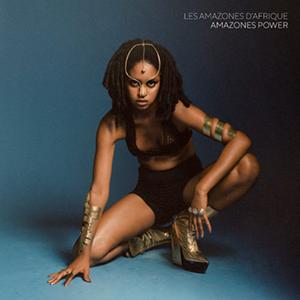West-African female super group Les Amazones d'Afrique returns with a successor for their 2017 album debut 'République Amazone'. Driving forces behind the project remain Mamani Keita and Rokia Kone, but on 'Amazon Power' the rest of the lineup largely consists of young lionesses like Beninese Fafa Ruffino, Guinean Niariu, Malian Ami Yerewolo, Ivorian Kandy Guira, and Algerian Nacera Ouali Mesbah, this time even complemented with the male voices of Douranne 'Boy-Fall' Fall (opener 'Heavy') and Amadou Denbélé ('Timbuktu', 'Dogon'). Beninese Fafa Ruffino is very clear about her motivation to participate in the project: "The first thing was the concept… I mean, asking different female singers to team up and fight for women's rights, by using music as the ultimate force, is just amazing. I came running because I felt this was a duty call, and even more than that… We come from different countries, yet we're facing the same issues in our home towns. We need to show the world that there are no boundaries when it comes to standing for our rights… It felt like the universe put us together. We were fighting alone, and something pushed our energy to meet.". Guinean musician, dancer and singer Niariu reacts with the same enthusiasm: "To me particularly, the biggest message would be to say that there are voices that really need to be heard and we have to make space for all women to express themselves and take part in solutions. We can't make feminism only about gender equality in western countries when a lot of women don't have access to basic human rights. If we're not all free, then some become the oppressors while others stay oppressed. This project is called Les Amazones d'Afrique, but I think it's important not to put it in a "box". People need to start realizing that the African continent is a significant part of the world. Everything is international about this project, from the people that worked on it to the languages and the sounds we're using, to the message we're sharing, and I hope everyone will embrace it as a whole.". In the songs on this second long player, 'Amazones Power', the ladies do not shy away from sensitive themes like misogyny, domestic violence ('Queens'), female sexuality, forced marriages and even female circumcision. Once again at the controls: Liam Farrel aka Doctor L, providing the perfect balance between Western electronics and Western- and this time also North-African music (thanks to the contribution of Algerian Nacera Ouali Mesbah in 'Rebels'). Niariu: "The musical fusion that we find in this album is unique. We are singers with different voices, and our own unique styles. We sing in many different languages, as well. I think the challenge was to go out of our comfort zone by writing on instrumentals we were not necessarily used to, for instance, fusions of electronic sounds, African traditional sounds, reggae elements, and hip-hop elements, and bring to it a message, a melody, a language that sounds like us. I think this is what allows our project to transcend cultures, generations and backgrounds. It's more than just words or just sound, it's a deeper experience.". As far as Niariu is concerned, 'Amazones Power' is the perfect title for this new opus: "Power means everything; we are all coming together to change the rules that have been established for centuries. Women are taking over the world, you know! With this album, we are breaking the code, by talking about violence against women and young girls, genital mutilation, forced marriage, gender equality. We want to make our sisters and mothers understand that it's up to us what makes us happy and fulfilled. Older generations of women did they best to survive and change things, by making sure the next generations would have even more tools to evolve as women, now the new generations refuse to be sacrificed; they're here to break the cycle of pain and of the image of the strong woman who has to be quiet and carry all the burdens. We are amazing and powerful, and every time that society tries to make us feel otherwise, we will be loud and unapologetic. It's a way of saying that we have the power within us. Once we're fully conscious of this, deep transformations can happen!". On the album, that powerful feminist message is crystallized in closing and title track 'Power', in which the voices of no less than 16 (!) vocalists from Africa, Europe and Latin America can be heard, dreaming of a shared future with true gender equality!


